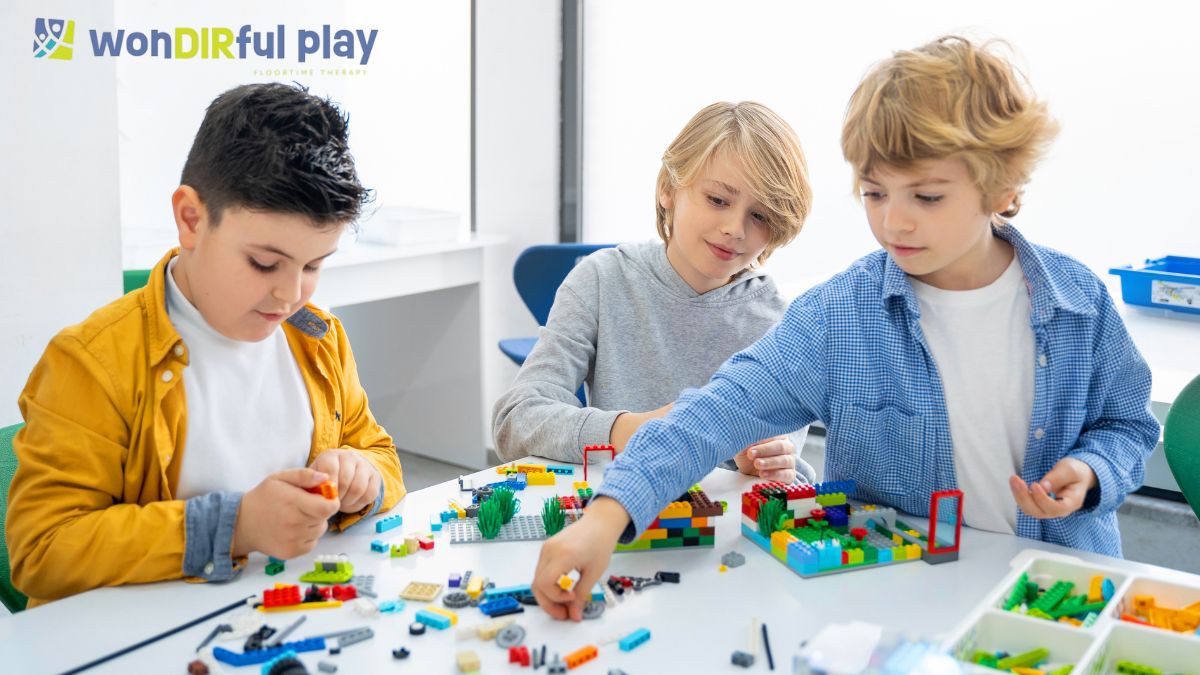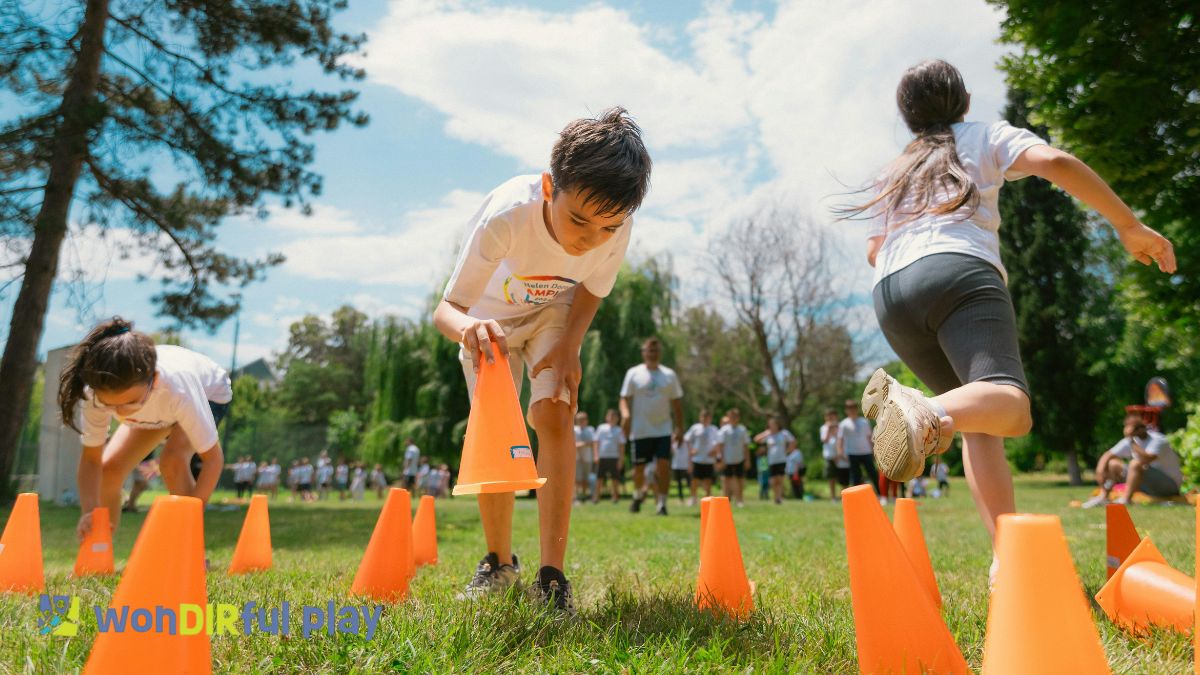Floortime Activities to Improve Social Skills in Kids
August 26, 2025
Boost connection and communication through Floortime social skills activities. See how structured play builds everyday interaction for children with autism.

Key Points:
- Structured Floortime social skills activities like LEGO play, music games, and treasure hunts strengthen communication.
- Role-based tasks, rhythm copying, and pretend play give children real chances to practice connection.
- Research shows Floortime improves joint attention, emotional growth, and everyday social participation in autism.
Floortime activities that enhance social skills include LEGO team builds with role swaps, beat-and-echo music for turn-taking, treasure hunts for joint attention, pretend cafés for role-play, and obstacle courses that build teamwork, showing how structured play supports autism communication and daily interaction.
Why does joining a simple game or conversation feel so hard for some children? In the next sections, you’ll see how everyday games and role-play can spark real connection and build stronger communication step by step.

1. LEGO Team Build For Social Skills.
You know how kids light up when building something together? Structured LEGO play does more than entertain. It gives children practice with teamwork, conversation, and problem-solving in real time. That’s where structured roles and planned swaps make the activity a practical tool for growth in Floortime social skills activities.
Set Roles: Builder, Supplier, Checker
Clear roles turn play into communication practice.
- Builder – puts pieces together step by step.
- Supplier – gathers and hands over the right bricks.
- Checker – confirms each step and prompts fixes if needed.
These roles create natural reasons to talk, ask questions, and clarify instructions. Simple models and visual role cards help children stay on task.
Swap Roles And Praise Partners
Switching roles builds flexibility and perspective-taking.
- Rotate builder, supplier, and checker every few minutes.
- Use timers as gentle reminders to switch.
- Let kids pick their next role to keep them engaged.
Role swaps spread conversation time and reduce pressure on one child. That’s why educators also use similar activities in play therapy for social development.
2. Floortime Autism Social Skills: Beat-And-Echo Music Game
While building with bricks is one way to practice conversation, rhythm works just as well. Music-based Floortime social skills activities use beat-and-echo games to strengthen attention, imitation, and timing.
Tap-Copy Patterns To Ten Turns
Simple rhythm copying helps children tune in to others.
- Keep early patterns short and predictable.
- Gradually lengthen to challenge memory and turn-taking.
- Use “my turn/your turn” gestures and count turns aloud.
- End rounds with a shared beat to celebrate matching.
Inviting a child to lead the next pattern makes imitation and initiation flow in both directions. That’s what makes beat games one of the most effective Floortime autism social skills tools.
Use Start And Stop Cues Together
Start/stop games train inhibition, which supports waiting and self-control in conversations.
- Pair a drum “go beat” with a chosen stop signal.
- Let children take a short turn as conductor.
- Keep runs brief with many resets to keep success frequent.
Adding simple words like “start,” “stop,” and “wait” links rhythm to communication. These structured social interaction games give children the practice they need to pause, respond, and join in more smoothly.
3. Social Interaction Games: Joint Attention Treasure Hunt
But let’s talk about another way kids learn to connect, which is by searching together. Joint attention, or looking at an object and then back to a partner, is a strong predictor of language. That’s why therapists often weave treasure hunts into Floortime social skills activities.
Point, Share Gaze, Label Finds
During a treasure hunt, every step is a chance to practice shared looking.
- Point clearly to the item.
- Wait for eye contact before labeling it.
- Expand naturally: “blue car fast.”
Prevalence data shows autism affects about 1 in 31 U.S. 8-year-olds, with boys over three times as likely to be identified as girls. Early practice with pointing and gaze gives children a strong foundation for communication.
Warm Up With Simon Says
Simon Says builds attention before the hunt.
- Start with two or three actions.
- Rotate leaders so children imitate and direct.
- Add social words like “copy me,” “wait,” or “your turn.”
Safe resets and quick wins keep kids engaged. Once children can manage the rules, treasure-hunt tasks add pointing, gaze-checking, and labeling together. That’s how shared play strengthens connection in play therapy for social development.
4. Play Therapy For Social Development: Pretend Café
You might notice how children light up when play feels real, which is why simple role-play is often built into Floortime autism social skills.
Order cards make practice feel purposeful.
- Use picture cards so children choose and request items.
- Keep requests short, like “I want juice, please.”
- Add timers to practice waiting while watching the “server.”
- Use a clear “ready” cue before handing over the drink.
Logging two simple targets, such as eye contact and a spoken request, makes progress easy to track.
Swapping roles turns practice into perspective-taking.
- Servers listen for orders and respond to small problems.
- Keep menus short and rotate specials for new words.
- Use scripts like “Say it again?” to repair breakdowns.
Ending each round with a quick review, where kids name one helpful partner move, reinforces what makes these social interaction games work.

5. Floortime Social Skills Activities: Obstacle-Course Helpers
Sure, physical play looks like exercise, but it also sets the stage for communication. Obstacle courses can double as Floortime social skills activities when each station encourages children to ask, wait, and respond together.
Build social moments into the course.
- Add tasks like tunnels, balance lines, or puzzle boxes.
- Require a peer or adult to help complete each challenge.
- Cue with short prompts: “ask a friend,” “say thank you.”
- Rotate “helper” badges so everyone offers and receives support.
Letting children choose the course builds connection.
- Follow their lead and label actions along the way.
- Add small challenges to keep interaction flowing.
- Match language to the child’s level and reflect their ideas.
- Use turn-taking cues like “my turn to climb, your turn to lead.”
A 2023 review found Floortime-based programs linked to better social and emotional skills, reinforcing why obstacle play is often included in Floortime autism social skills work.
Frequently Asked Questions
What is an example of Floortime therapy?
An example of Floortime therapy is when a therapist joins a child pushing cars by rolling another car. The therapist waits for eye contact and adds an obstacle by blocking the road. The child signals “go,” and the turns build circles of communication, problem-solving, and engagement while strengthening interaction.
Is DIR Floortime play therapy effective in social skills and emotion regulation of children with autism spectrum disorder?
DIR Floortime play therapy supports social skills and emotion regulation in children with autism spectrum disorder. Research shows gains in engagement and connection, especially with strong parent involvement. Reviews highlight positive outcomes, but evidence needs more large randomized trials.
What is the difference between Floortime and play therapy?
Floortime is a DIR-based model that builds emotional growth and communication through child-led circles of interaction. Play therapy is a broader approach that uses play for therapeutic goals, and its methods and outcomes vary by model and intensity.
Take the Next Step Toward Stronger Connections
Building social growth takes practice and the right kind of play. Families seeking Floortime social skills activities in New Jersey can benefit from structured approaches that turn everyday games into lasting communication skills.
WonDIRfulPlay provides guidance that helps children, parents, and educators work together for meaningful progress. Reach out to us today to get started.
Recent articles


-ink.jpeg)

-ink.jpeg)
-ink.jpeg)
-ink.jpeg)
-ink.jpeg)
-ink.jpeg)
-ink.jpeg)
-ink.jpeg)
-ink.jpeg)
-ink.jpeg)
-ink.jpeg)
-ink.jpeg)
-ink.jpeg)
-ink.jpeg)
-ink.jpeg)
-ink.jpeg)
-ink.jpeg)
-ink.jpeg)
-ink.jpeg)
-ink.jpeg)
-ink.jpeg)


-ink.jpeg)


-ink.jpg)
-ink.jpeg)

-ink.jpeg)
-ink.jpeg)
-ink.jpeg)



































































